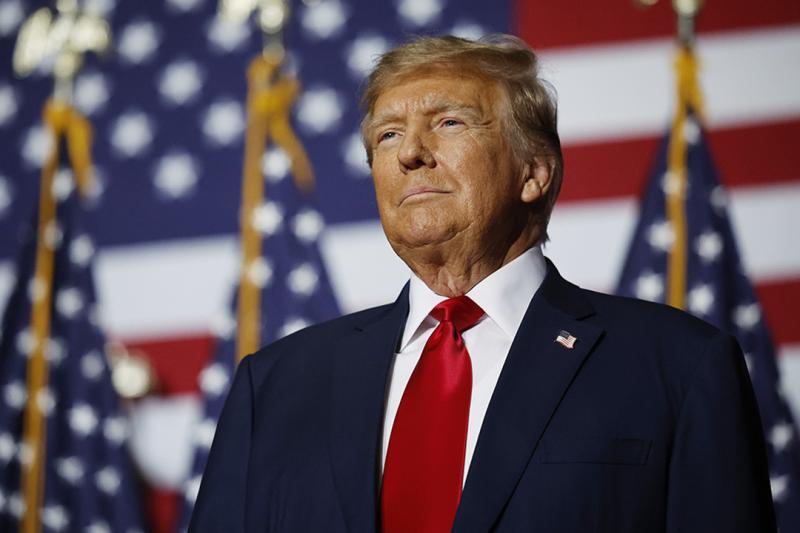
- agastya9
- 23 Oct 2024 05:09 AM
- Political News
The Trump campaign has been circulating a significant claim regarding illegal voters, highlighting a recurring theme of alleged election fraud tied to immigration. A recent email, sent to supporters by Lara Trump—former President Donald Trump’s daughter-in-law and Republican National Committee co-chair—was addressed to "REAL AMERICAN PATRIOTS" and pushed the idea that ensuring a victory "TOO BIG TO RIG" was essential. The email cited an alarming statistic: "Experts are saying that as many as 2.7 million illegals could vote in November." However, the number mentioned has dubious origins and is considered by many to be a significant overstatement.
The Origin of the 2.7 Million Figure
The claim traces back to a 2014 academic article titled "Do non-citizens vote in U.S. elections?" published in Electoral Studies. The paper, authored by three academics led by Jesse Richman from Old Dominion University, presented an estimate that the number of non-citizen voters could range from a low of 38,000 to as many as 2.8 million. However, the study didn’t directly analyze voter rolls or survey immigrants. Instead, it used data from the Cooperative Election Study (CES), a Harvard-supported survey examining voter behavior.
Richman’s conclusions were drawn from CES respondents who self-identified as non-citizens and indicated that they had voted in the 2008 and 2010 elections. However, the CES researchers themselves have repeatedly refuted Richman’s findings. Brian Schaffner, one of the CES’s principal investigators and a professor at Tufts University, argued that the sample size of non-citizen respondents was too small to form any broad conclusions. In 2008, only 339 out of 34,000 survey participants identified as non-citizens, a figure too limited for reliable statistical analysis. Furthermore, Schaffner pointed out that it’s common in surveys for participants to mistakenly select incorrect answers.
A New 1% Claim
Over the years, the CES has refined its questions about citizenship and voter registration to improve accuracy. In 2023, Richman revisited the CES data and concluded that about 1% of non-citizens were registered to vote, which equates to roughly 117,000 people, based on estimates of the undocumented immigrant population in the U.S. Richman acknowledged the uncertainties surrounding non-citizen voter registration but defended his findings. He argued that the political debate often focuses on the extremes: Democrats asserting that no non-citizens vote, while Republicans claim the issue is widespread. In his view, the truth likely lies between these extremes.
Schaffner, however, remains firm in his stance that the CES data cannot be used to extrapolate population-wide estimates regarding non-citizen voting.
The 2.7 Million Claim Resurfaces
In May 2024, the figure of 2.7 million non-citizen voters resurfaced when a pro-Trump fact-checking organization, Just Facts, published an article claiming that 10% to 27% of non-citizens are illegally registered to vote. The post suggested that between 1 million and 2.7 million immigrants might vote in the upcoming election. This figure quickly went viral in conservative online circles, with influential figures like Elon Musk amplifying the message.
Lara Trump referenced the same figure in two emails sent to Trump supporters in early October. When questioned, Just Facts founder James Agresti defended his estimates but noted the large uncertainty surrounding them. He acknowledged that Lara Trump’s emails had used the highest possible figure from his analysis.
Lack of Evidence
While allegations of non-citizen voting have gained significant attention, real-world evidence to support claims of widespread illegal voting remains limited. The Heritage Foundation, a conservative think tank, has compiled a database of voter fraud cases. However, only about 100 of these cases involve non-citizens voting, a small fraction of overall fraud cases.
Prosecution for illegal voting, including cases involving non-citizens and other ineligible voters such as felons, is rare. Despite persistent concerns from Republicans, investigations into voter rolls have revealed relatively few instances of non-citizens being registered or casting votes.
Jesse Richman’s survey of Arizona’s four million voter records found between 1,934 and 6,480 non-citizens registered to vote. Similarly, a 2024 investigation by Ohio’s Republican Secretary of State, Frank LaRose, found about 600 non-citizens registered among the state’s eight million voter records. Other states, such as New Jersey and Virginia, have also removed small numbers of non-citizens from their voter rolls in recent years.
A Limited Impact
Even if some non-citizens are registered to vote, the number of confirmed illegal voters is tiny when compared to the broader electorate. For example, only about half to two-thirds of registered American voters typically participate in presidential elections. Given the small proportion of non-citizens who might be registered and then actually vote, the impact of illegal voting by immigrants is likely even smaller.
In conclusion, while some non-citizens are undoubtedly registered to vote, there is little evidence to suggest that illegal voting is widespread or that it will significantly affect election outcomes.





































